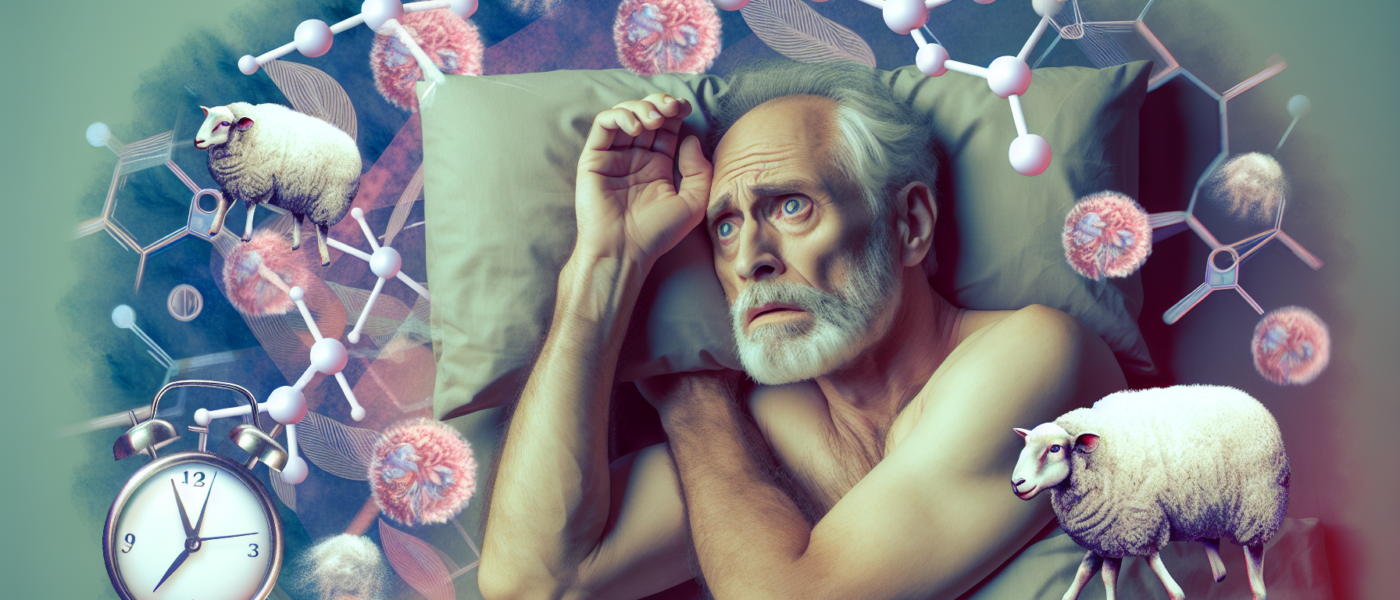Hormonal Changes and Sleep Disruptions in Aging Men
Key Takeaways
- Aging in men often results in significant hormonal changes, particularly a decline in testosterone levels.
- These hormonal fluctuations can lead to various health issues, including sleep disturbances.
- The relationship between hormones and sleep is intricate, influencing both the quality and duration of sleep.
- There are strategies and treatments available to mitigate these sleep disruptions.
Introduction
As men age, their bodies go through numerous hormonal adjustments that significantly affect their overall health and well-being. One of the most commonly experienced issues among aging men is sleep disruption, often linked to changes in hormonal levels. Understanding the relationship between these hormonal changes and sleep quality is crucial for managing age-related health concerns effectively.
Hormonal Changes in Aging Men
Hormonal imbalances are a natural part of the aging process. In men, the most prominent hormonal change is a gradual decline in testosterone levels. This phenomenon, often referred to as andropause or male menopause, can start as early as the age of 30 and can affect various bodily functions.
Testosterone Reduction
Testosterone is the hormone primarily responsible for male sexual development, muscle mass, bone density, and the production of red blood cells. As men age, the body’s ability to produce testosterone diminishes, leading to a range of physiological and psychological effects including:
- Decreased libido
- Reduced muscle mass and strength
- Increased body fat
- Mood changes, such as depression and irritability
- Decreased cognitive function
- Lower energy levels
Impact on Other Hormones
The decline in testosterone is often accompanied by changes in other hormones such as melatonin, cortisol, and growth hormone, all of which play vital roles in regulating sleep patterns.
- Melatonin: This hormone regulates the sleep-wake cycle, and its production often decreases with age, leading to difficulties in falling and staying asleep.
- Cortisol: Known as the stress hormone, cortisol levels can become dysregulated with aging, resulting in increased nighttime wakings and reduced deep sleep.
- Growth Hormone: Essential for tissue repair and regeneration, the production of growth hormone also diminishes with age, contributing to reduced quality of sleep.
How Hormonal Changes Affect Sleep
Sleep is a complex process influenced by a variety of factors, including the body’s hormonal milieu. Here are some ways in which hormonal changes in aging men disrupt sleep:
Insomnia
The decline in testosterone and melatonin levels can lead to difficulty falling and staying asleep. Insomnia is a prevalent issue among older men, often resulting in fragmented sleep and excessive daytime sleepiness.
Sleep Apnea
Testosterone deficiency has been linked to an increased risk of sleep apnea, a condition characterized by repeated interruptions in breathing during sleep. This can lead to poor sleep quality, loud snoring, and daytime fatigue.
Restless Legs Syndrome (RLS)
Hormonal changes can also contribute to conditions like Restless Legs Syndrome, a disorder that causes an uncontrollable urge to move the legs, particularly at night, disrupting sleep continuity.
Reduced REM and Deep Sleep
REM (Rapid Eye Movement) and deep sleep are critical for cognitive function and physical health. Hormonal declines can reduce the duration and quality of both REM and deep sleep, leading to impaired memory, learning difficulties, and physical fatigue.
Increased Nighttime Urination
As men age, they are more likely to experience nocturia, or frequent urination during the night. Hormonal changes, along with other factors such as prostate enlargement, can exacerbate this issue, resulting in disrupted sleep.
Strategies to Mitigate Sleep Disruptions
While hormonal changes are an inevitable part of aging, several strategies can help mitigate their impact on sleep quality. These include lifestyle modifications, medical treatments, and natural remedies.
Lifestyle Changes
- Regular Exercise: Engaging in physical activity can improve sleep quality and boost testosterone levels. However, it’s essential to avoid vigorous exercise close to bedtime.
- Healthy Diet: A diet rich in nutrients, particularly those that support hormonal balance, can significantly enhance sleep quality. Foods high in antioxidants, vitamins, and minerals are beneficial.
- Sleep Hygiene: Establishing a regular sleep routine, creating a comfortable sleep environment, and avoiding stimulants like caffeine and nicotine can promote better sleep.
Medical Treatments
- Hormone Replacement Therapy (HRT): Testosterone replacement therapy can help alleviate symptoms associated with low testosterone levels, improving sleep and overall quality of life.
- Medications: Certain medications can help manage conditions like insomnia, RLS, and sleep apnea, although they should be used under medical supervision to avoid adverse effects.
- CPAP Therapy: For those with sleep apnea, Continuous Positive Airway Pressure (CPAP) therapy is often effective in improving sleep quality by maintaining open airways during sleep.
Natural Remedies
- Melatonin Supplements: Taking melatonin supplements can help regulate the sleep-wake cycle, especially in those experiencing a decline in natural melatonin production.
- Herbal Supplements: Herbs like valerian root, chamomile, and lavender have been traditionally used to promote relaxation and improve sleep quality.
- Mind-Body Techniques: Practices such as yoga, meditation, and deep breathing exercises can help reduce stress levels and enhance sleep quality.
Conclusion
Aging is an inevitable process that brings about various physiological changes, including hormonal fluctuations that can significantly impact sleep quality. By understanding the relationship between hormonal changes and sleep disruptions, aging men can take proactive steps to improve their sleep and overall health. Adopting a combination of lifestyle modifications, medical treatments, and natural remedies can help mitigate the effects of hormonal imbalances and promote better sleep, enhancing the quality of life.

